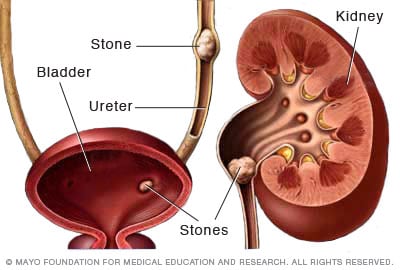Kidney Stones vs UTI: Just How to Identify and Treat Each Condition Successfully
Kidney Stones vs UTI: Just How to Identify and Treat Each Condition Successfully
Blog Article
Exploring the Effects and Causes of Kidney Stones in Comparison to Urinary System System Infections: A Comprehensive Overview
The exploration of kidney stones and urinary tract infections (UTIs) exposes a complicated interaction of signs and symptoms and underlying reasons that necessitate cautious exam. What are the key differences in their symptoms, and how might these inform treatment strategies?
Summary of Kidney Stones
Kidney stones, also known as kidney calculi, kind when particular materials in the pee crystallize and accumulation, causing the advancement of difficult deposits within the kidneys. These stones can vary in dimension, ranging from a grain of sand to a golf sphere, and can be composed of various products, one of the most usual being calcium oxalate, uric acid, struvite, and cystine. The development of kidney stones is influenced by several variables, consisting of nutritional habits, liquid consumption, and hereditary tendency.
Symptoms of kidney rocks might include severe discomfort in the back or side, blood in the pee, queasiness, and frequent peeing, specifically as the rock relocates through the urinary system system. Medical diagnosis typically involves imaging researches such as ultrasound or CT scans, alongside urinalysis to recognize the rock's structure.
Therapy alternatives vary based upon the dimension and type of rock, in addition to the seriousness of signs and symptoms (Kidney Stones vs UTI). Little stones might pass naturally with increased liquid intake, while bigger stones might need clinical treatments such as lithotripsy or medical removal. Recognizing the pathophysiology and danger factors linked with kidney stones is essential for reliable prevention and monitoring
Summary of Urinary System Tract Infections
Urinary tract infections (UTIs) are typical microbial infections that influence any part of the urinary system, including the kidneys, ureters, bladder, and urethra. They mainly take place when bacteria, frequently from the intestinal system, get in the urinary system, leading to swelling and infection.
The prevalence of UTIs is notably higher in ladies than guys, mostly as a result of physiological differences, such as a much shorter urethra. Risk elements include sex-related activity, specific contraceptive techniques, urinary system retention, and dehydration. The medical diagnosis of UTIs is usually validated via urine examinations, which may expose the existence of germs, leukocyte, or red blood cells.

Signs And Symptoms of Kidney Stones
The pain connected with kidney stones can manifest in numerous means, commonly leading individuals to seek clinical focus. One of the most common signs and symptoms is serious pain, generally localized in the reduced back or side, which may radiate to the abdominal area or groin. This pain, frequently called sharp or cramping, can take place unexpectedly and may fluctuate in strength.
Furthermore, individuals might experience hematuria, or blood in the urine, which can vary from microscopic total up to visible discoloration. This signs and symptom may be accompanied by adjustments in urinary habits, such as boosted frequency or necessity, in addition to discomfort throughout urination. Queasiness and vomiting are likewise prevalent, usually resulting from the body's response to intense discomfort.
In some situations, people may experience high temperature and cools, particularly if a second infection develops because of the blockage brought on by the stones. On the whole, the combination of serious discomfort, hematuria, transformed urinary patterns, and intestinal signs and symptoms can give considerable understanding right into the presence of kidney stones, calling for punctual medical assessment and treatment. Recognizing these symptoms is important for prompt medical diagnosis and efficient monitoring of the condition.
Symptoms of Urinary Tract Infections
Infections within the urinary system usually offer a variety of distinctive signs that can substantially influence life. The most typical signs and symptoms consist of a relentless impulse to pee, usually accompanied by a burning experience throughout peeing, called dysuria. People might additionally experience enhanced frequency of urination, creating small amounts of urine each time.
Other notable signs and symptoms consist of fetid or over cast pee, which may show the presence of microorganisms or pus. Sometimes, pee may appear red or pink as a result of the visibility of blood, a problem referred to as hematuria. Additionally, individuals might experience pelvic pain or stress, which can further aggravate the sensation of seriousness.
Systemic symptoms may additionally materialize, such as fever, cools, and exhaustion, particularly if the infection has risen to the kidneys. It is necessary to acknowledge these signs and symptoms early, as unattended urinary system tract infections can bring about a lot more severe complications. Kidney Stones vs UTI. Motivate medical focus is encouraged when these symptoms are observed, permitting proper analysis analysis and treatment to ease discomfort and prevent further wellness issues
Reasons For Each Problem
Often, kidney stones and urinary system tract infections emerge from unique yet sometimes overlapping reasons that can affect people differently. Kidney rocks typically create as a result of metabolic aspects, dietary options, and hereditary predispositions. Raised levels of calcium, oxalate, or uric acid in the pee can bring about stone development. Dehydration, insufficient fluid consumption, and high-sodium diets can intensify these problems, promoting formation within the urinary tract.

Recognizing these distinct reasons is crucial for avoidance and therapy. Kidney Stones vs UTI. While way of life adjustments may mitigate the risk of kidney rocks, proper hygiene and prompt treatment of urinary system tract infections are essential for reducing their recurrence and linked issues
Final Thought
In summary, kidney rocks and urinary system tract infections more existing distinctive signs and underlying causes. Kidney rocks are characterized by severe discomfort and metabolic elements, while urinary system infections mainly entail bacterial infections leading to urinary system urgency and discomfort.
The expedition of kidney rocks and urinary system infections (UTIs) discloses an intricate interplay of symptoms and underlying causes that necessitate careful assessment.Urinary system tract infections (UTIs) are typical microbial infections that affect any kind of part of the urinary system, consisting of the kidneys, ureters, bladder, and find out urethra.Frequently, kidney stones and urinary system system infections arise from distinct yet often overlapping reasons that can affect individuals in a different way.In recap, kidney stones and urinary tract infections present distinctive signs and underlying reasons. Kidney rocks are characterized by severe pain and metabolic aspects, while urinary system system infections largely include bacterial infections leading to urinary seriousness and discomfort.
Report this page